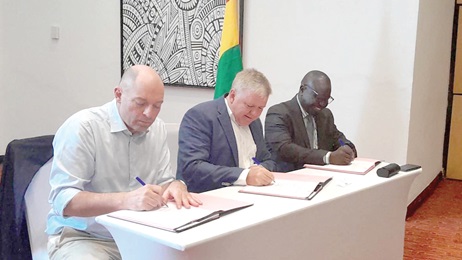
Ghana and Denmark have signed the second phase of the strategic sector cooperation (SSC) on statistics to promote evidence-based decision-making in the country.
This follows the successful implementation of phase one of an initial project which focused mainly on capacity building.
Representatives from the Ghana Statistical Service (GSS), Statistics Denmark (SD) and the Danish Embassy signed the memorandum of understanding in Accra.
Prof. Samuel Annim, the Government Statistician, signed on behalf of the GSS, while the Ambassador of Denmark in Ghana, Tom Norring, and the Head of Communications and Sales, Carsten Zangenberg, signed on behalf of the Embassy and Denmark respectively.
Significance
Among other objectives, the agreement is to ensure informed decision-making among policymakers, enhance accountability and also monitor progress of Ghana’s green transition for relevance and effectiveness.
It is also to strengthen the county’s statistical system by leveraging survey and administrative data efficiently, while addressing existing data gaps through digitalisation.
It would also focus on supporting the implementation of a system of environmental-economic accounts (SEEA) and contribute to Ghana’s sustainable development efforts.
Strides
Prof. Annim said the agreement would improve the nation’s strides in information dissemination, adding, “we are in an era where information is at our doorstep”.
“We translate that into data, and that is why every now and then you see the GSS in the news with one statistic or another,” he said.
Prof. Annim further stressed the importance of accessible data and research in facilitating real-time interventions such as the school feeding programme.
Success
For his part, Mr Norring highlighted the prospects of the second phase of the agreement, citing the successful implementation of the initial phase as a driving force behind its continuation.
“Beyond the success of phase one, I truly look forward to the phase two of our collaboration.
“I am particularly intrigued to follow the advancements of the green transition driven by advancements on the collection and use of administrative data, for example, on households and industries’ water consumption or on emissions from various industries,” he added.























